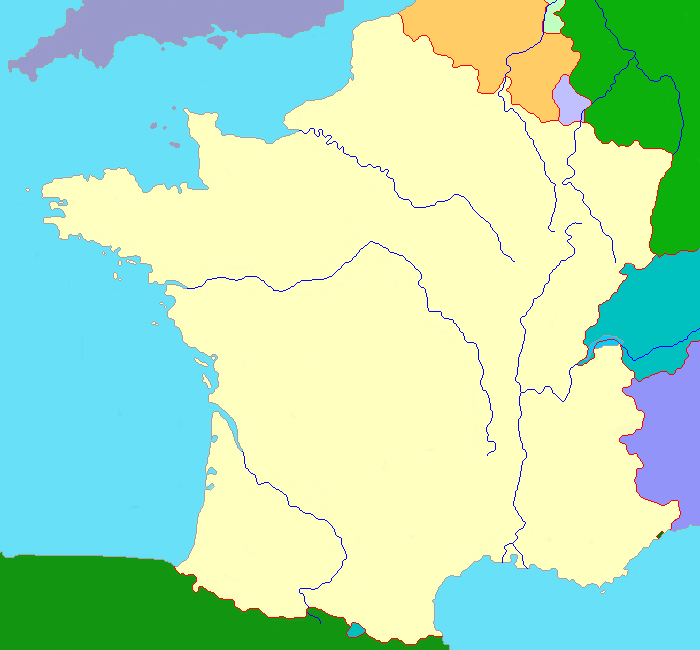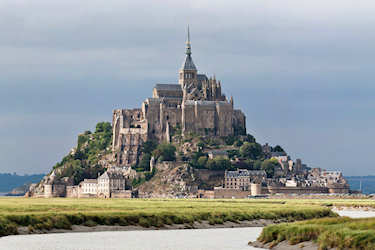France

Historie
The oldest traces of human life in what is now France date from approximately 1.8 million years ago. Humans
were then confronted by a hard and variable climate, marked by several glacial eras which led them to a nomadic
hunter-gatherer life. The Paleolithic cave paintings of Gargas (c. 25.000 BC) and Lascaux
(c. 15.000 BC) as well as the Neolithic-era Carnac stones (c. 4500 BC) are among the many remains of local
prehistoric activity in the region.
In the Chalcolithic and Early Bronze Age the territory of France was largely dominated by the Bell Beaker culture
(2800–1800 BC), followed by the Armorican Tumulus culture (2200–1400 BC), Rhône culture (2200-1500 BC),
Tumulus culture (1600–1200 BC), Urnfield culture (1300–750 BC) and Atlantic Bronze Age culture
(1300—700 BC), among others. The Iron Age saw the development of the Hallstatt culture (1200–450 BC) followed
by the La Tène culture (450—1 BC), the final cultural stage prior to Roman expansion across Gaul.
In 600 BC, Ionian Greeks, founded the colony of Massalia (present-day Marseille), on the shores of
the Mediterranean Sea. This makes it France's oldest city. At the same time, some Gallic Celtic tribes
penetrated parts of the current territory of France, and this occupation spread to the rest of France between the
5th and 3rd century BC.
Around 125 BC, the south of France was conquered by the Romans, who called this region Provincia Romana
("Roman Province"), which over time evolved into the name Provence in French. Julius Caesar conquered the
remainder of Gaul and overcame a revolt carried out by the Gallic chieftain Vercingetorix in 52 BC.
From the 250s to the 280s AD, Roman Gaul suffered a serious crisis with its fortified borders being attacked on several
occasions by barbarians. Nevertheless, the situation improved in the first half of the 4th century, which
was a period of revival and prosperity for Roman Gaul. But, from the beginning of the 5th century, the Barbarian Invasions
resumed. Teutonic tribes invaded the region from present-day Germany, the Visigoths settling in the southwest,
the Burgundians along the Rhine River Valley, and the Franks in the north.
In 498, Clovis I was the first Germanic conqueror after the fall of the Roman Empire, to unite all of the
Frankish tribes under one ruler, changing the form of leadership from a group of royal chieftains to rule by a
single king and ensuring that the kingship was passed down to his heirs. He is considered the founder of the
Merovingian dynasty, which ruled the Franks for the next two centuries.
In 751 Pepin the Short, seized the crown of Francia from the weakened Merovingians and founded the
Carolingian dynasty. Pepin's son, Charlemagne, reunited the Frankish kingdoms and built a vast
empire across Western and Central Europe.
The Carolingian dynasty ruled France until 987, when Hugh Capet, was crowned King of the Franks. His
descendants – the Capetians, the House of Valois, and the House of Bourbon – progressively unified the country
through wars and dynastic inheritance into the Kingdom of France, which was fully declared in 1190 by
Philip II Augustus.
During the reign of Philip of Valois, the French monarchy reached the height of its medieval power. However Philip's
seat on the throne was contested by Edward III of England in 1337, and England and France entered the off-and-on
Hundred Years' War (1337–1453).
The Hundred Years' War almost resumed in 1474, when the duke Charles of Burgundy, counting on English support, took
up arms against Louis XI. Louis managed to isolate the Burgundians by buying Edward IV of England off with
a large cash sum and an annual pension, in the Treaty of Picquigny (1475). The treaty formally ended the Hundred
Years' War with Edward renouncing his claim to the throne of France. With the death in 1477 of Charles, France and the
House of Habsburg began a long process of dividing his rich Burgundian lands, leading to numerous wars. In 1532,
Brittany was incorporated into the Kingdom of France.
In 1559, Henry II of France signed two treaties (Peace of Cateau-Cambrésis): one with Elizabeth I of England
and one with Philip II of Spain. This ended long-lasting conflicts between France, England and Spain.
The rise of Protestantism in Europe led France to a civil war known as the French Wars of Religion (1562-1598), where,
in the most notorious incident, thousands of Huguenots were murdered in the St. Bartholomew's Day massacre
of 1572. The Wars of Religion were ended by Henry IV's Edict of Nantes, which granted some freedom of religion to the
Huguenots.
The monarchy reached its peak during the 17th century and the reign of Louis XIV (1643-1715). By turning powerful feudal
lords into courtiers at the Palace of Versailles, Louis XIV's personal power became unchallenged. Remembered for his
numerous wars, he made France the leading European power.
After the Storming of the Bastille on 14 July 1789, the absolute monarchy was abolished and France became
a constitutional monarchy.
Napoleon Bonaparte took power in a coup d'état in 1799 becoming First Consul and later Emperor of the
French Empire (1804–1814/1815) His armies conquered most of continental Europe, while members of the Bonaparte
family were appointed as monarchs in some of the newly established kingdoms. These victories led to the worldwide
expansion of French revolutionary ideals and reforms, such as the Metric system, the Napoleonic Code
and the Declaration of the Rights of Man. After the catastrophic Russian campaign, Napoleon was defeated and
the Bourbon monarchy restored. About a million Frenchmen died during the Napoleonic Wars. After his brief return
from exile, Napoleon was finally defeated in 1815 at the Battle of Waterloo, the monarchy was re-established
(1815–1830), with new constitutional limitations.
In 1852, the president of the French Republic, Louis-Napoléon Bonaparte, Napoleon Bonaparts nephew, was
proclaimed emperor of the Second Empire, as Napoleon III. Napoleon III was unseated following defeat in
the Franco-Prussian War of 1870 and his regime was replaced by the Third Republic. (1870 - 1940)
On August 1914 Germany's "Schlieffen Plan" was to quickly defeat the French. They captured Brussels, by 20 August
and soon had captured a large portion of northern France. The original plan was to continue southwest and attack Paris
from the west. By early September they were within 65 kilometres of Paris, and the French government had relocated to
Bordeaux. The Allies finally stopped the advance northeast of Paris at the Marne River (5–12 September 1914)
The war now became a stalemate – the famous "Western Front" was fought largely in France and was characterized by
very little movement despite extremely large and violent battles, often with new and more destructive military technology.
The Treaty of Versailles (1919) ended the state of war between Germany and most of the Allied Powers.
In 1940, France was invaded and quickly defeated by Nazi Germany. France was divided into a German occupation zone
in the north, an Italian occupation zone in the southeast and an unoccupied territory, the rest of France; the
Vichy government, a newly established authoritarian regime collaborating with Germany, ruled the unoccupied territory.
In June 1944 Allied forces invaded and forced the Germans to retreat.
The French Fourth Republic was the republican government of France between 1946 and 1958, governed by the
fourth republican constitution. The Fourth Republic saw an era of great economic growth in France and the rebuilding
of the nation's social institutions and industry after World War II, and played an important part in the development
of the process of European integration which changed the continent permanently.
In 1958 Charles de Gaulle founded the French Fifth Republic and served as its first president from
1959 to 1969.
In April 1969, de Gaulle resigned following the defeat in a national referendum of government proposals for decentralization,
through the creation of 21 regions with limited political powers. He was succeeded by the Gaullist Georges Pompidou
(1969–74), who died during his term. Pompidou's succession pitted the Gaullists against the more classical conservatives
who eventually won, headed by the Independent Republican Valéry Giscard d'Estaing (1974–81).
At the 1981 presidential election, during which for the first time in the Fifth Republic a left-wing candidate won. François
Mitterrand, re-elected in 1988, followed a left-wing inspired social and economic program. The conservative President
Jacques Chirac assumed office May 17, 1995, after a campaign focused on the need to combat France's stubbornly high
unemployment rate. Macron formally became president on 14 May 2017
I have visited France several times
In June 2024 i visited Parc Naturel régional de la Brenne
In march 2004 I visited French Guiana
it was part of my visit to Suriname
These are the places i have seen
Saint Laurant du Maroni
In april 2015 I visited New Caledonia
it's part of the West Pacific Odesey
These are the places i have seen
Nouméa
Please let me know when you're having questions.
i would be pleased to help you.
Things to do and other tips
